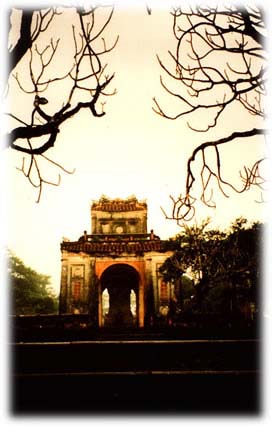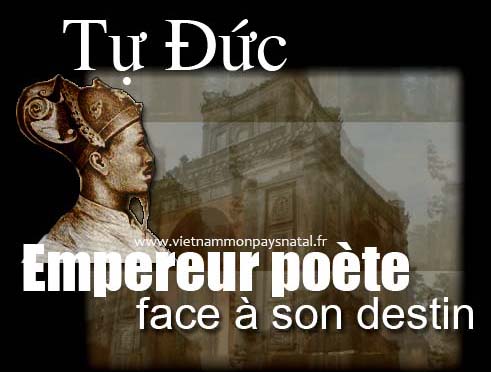Hồng Nhậm
(1847-1883)
A great tribute to the poet-emperor Tự Đức through my four verses in Six-Eight:
Ngậm ngùi thương xót phận mình
Làm vua chẳng có quang vinh chút gì
Thực dân chiếm đất ở lì
Trẩm đây buồn tủi, sử thì kết oan
I painfully pity my fate
« Being king » does not deserve enough glory
The colonialists confiscated the land to stay there
I am plunged into sadness and humiliation while history has condemned me.
Version vietnamienne
Version française
Galerie des photos
Being the fourth emperor of the Nguyễn dynasty, Tự Ðức was known by the name Hồng Nhậm when he was still a young prince. He was the youngest son of Emperor Thiệu Trị. The latter decided to change his mind at the last minute in his royal will by designating him as the deserving successor instead of the crown prince Hồng Bào, his brother, on the pretext of debauchery. His enthronement was greatly disturbed by the fainting of his brother Hồng Bào before the Court, followed by the imprisonment of the latter, later accused of collusion with Catholic priests and Europeans in view of a coup d’état. Hồng Bào was shortly thereafter eliminated in prison, which later raised some criticisms directed at the emperor by his subordinates through their poems. He was reproached for lacking the magnanimity that King Cao Pi (Tào Phi) had reserved for his brother Cao Tseu (Tào Thực), a great poet also ousted from power during the Three Kingdoms period in China. This was the case of the mandarin Nguyễn Hàm Ninh. One fine day, Tự Ðức, who had accidentally bitten his tongue with his teeth at lunchtime, decided to choose as a poetry subject the theme « the injury caused by teeth » and asked his subordinates to compose poems focused on this theme. Nguyễn Hàm Ninh took advantage of this suggestion to promptly address him with his following four-line epic poem:
Ta ra đời trước chú chưa sinh
Chú phận làm em, ta phận anh
Ngọt bùi sao chẩng cùng san sẽ
Mà nỡ đau thương cô’t nhục tình?
I was born before your birth
You are my little brother, I am your big brother
Why don’t you share happiness with me instead of tearing each other apart so miserably?
Nguyễn Hàm Ninh was thus rewarded for his extraordinary talent with several taels of gold, but at the same time, he received a blow with a stick for each verse composed because each verse was meaningful and profound. Tự Ðức was a great poet of his time. That is why he had an undeniable preference for all the great poets of his era. They were appreciated at their true value even at times when his authority and self-esteem could be insulted by harsh and bitter criticism from independent and strong-willed people like Cao Bá Quát. The latter did not cease to ridicule him many times in front of the mandarins, but he did not hesitate to shower him with praise when Cao Bá Quát managed to aesthetically return his antithetical statement while relying on the calling statement proposed by Tự Ðức through a clever play on words. Taking advantage of Cao Bá Quát’s presence, Tự Ðức spontaneously issued the calling statement:
Nhất bào song sinh, nan vi huynh, nan vi đệ
Một bọc sinh đôi, khó làm anh, khó làm em
There is only one embryo for two human lives. It is difficult to be the older brother but it is also difficult to be the younger brother.
To remind Cao Bá Quát that they were twin brothers (him and his brother Cao Bá Ðạt) who were hard to distinguish.
Cao Bá Quát immediately made the following statement in response:
Thiên tài thất ngộ, hữu thị quân, hữu thị thần
Nghìn năm gập một, có vua ấy, có tôi ấy.
There is only one time in a thousand years. There is the good king but there is also the good servant.
To remind Tự Ðức that a good king is always served by a good servant. Despite this, Tự Ðức was not entirely satisfied because he also knew that it was an intelligent and subtle allusion to the Vietnamese proverb (vỏ quýt dày, móng tay nhọn) (or in French, « à bon chat, bon rat« ).
Not only do we find the same number of words in both the calling statement and the called statement, but also the same position for each repeated word. Once again, Cao Bá Quát was not very happy to see the following two antithetical verses composed by Tự Ðức hanging at the entrance of the Cần Chánh palace:
Tử năng thừa phụ nghiệp
Thần khả báo quân ân.
The capable son inherits the father’s profession
The worthy subject is always grateful to the benevolent king.
He was surprised and asked him the reason for his dissatisfaction. Cao Bá Quát said to him:
The word « Tử » (or son in French) cannot be placed before the word « phụ » (or father in French). Similarly, the word « Thần » (or subject in French) cannot precede the word « quân » (or king in French). This no longer conforms to our hierarchical order.
Tự Ðức asked him to correct this mistake. Without hesitation, Cao Bá Quát instantly recited the following two verses:
Quân ân, thần khả báo
Phụ nghiệp, tử năng thừa
For the king’s benefits, the deserving subject is grateful.
For the father’s trade, the capable son inherits.
Despite his romantic nature and delicate temperament, Tự Ðức was the emperor who knew very little serenity and tranquility during his reign. He had to face not only the development of Western capitalism but also internal troubles due to the eviction of his elder brother Hồng Bào, the Locust War led by Cao Bá Quát later, etc. The loss of the six provinces of Nam Bộ continuously haunted him and plunged him painfully into everlasting sadness because he was the first emperor of the Nguyễn dynasty to bear the heavy responsibility of letting a part of Vietnamese territory slip into the hands of foreigners, particularly the one from which his mother originated.
Tự Đức stele

The absence of an heir prince due to his sterility caused by smallpox he contracted when he was young, the suicide of the scholar Phan Thanh Giản, governor of the western provinces of Nam Bộ, saddened him and forced him to often seek refuge in his beautiful red wooden pavilions Du Khiêm and Xung Khiêm, which have now become favorite places for foreign and Vietnamese tourists. It was here that he composed poems, the most famous remaining the love poem titled « Khóc Bằng Phi (Tears for My Concubine) » and immortalized by the following two verses:
Ðập cổ kính ra, tìm lấy bóng
Xếp tàn y lại để dành hơi
I break the old mirror to search for your shadow
I fold your worn clothes to keep your warmth.
Being a pious child, Tự Ðức reigned under the shadow of his mother, Empress Từ Dũ. He took into consideration everything the queen mother had suggested to him. One fine day, while watching the Chinese dramatic theatrical masterpiece titled « Conquest of the West » (Ðường Chinh Tây), the queen mother was shocked by the scene where the heroine Phàn Lê Huê killed her father. To please his mother, Tự Ðức was forced to ask the mandarin in charge of entertainment to completely modify the content of the scene to no longer show this infamous tragedy contrary to the Confucian spirit. The rehabilitation of the mandarin Phạm Phú Thứ in the role of academician responsible for consultation books was not unrelated to the reprimand Tự Ðức had received from the queen mother. This mandarin dared to ask Tự Ðức to correct his laziness because since his accession to the throne, he had abolished grand audiences and gave no follow-up to submitted petitions. Despite his crime of lèse-majesté, Phạm Phú Thứ was not dismissed but rejoined the Court assembly and became a great mandarin under his reign. Due to the influence of the Confucian mandarin clan, Tự Ðức could not initiate reforms in time despite the warning and the pathetic memorandum of the patriotic scholar Nguyễn Trường Tộ.
He did not know how to take advantage of favorable opportunities to bring Vietnam onto the path of modernity, but instead sank deeper into isolation, sadness, and loneliness since the annexation of the six provinces of Nam Bộ by the French colonial authorities.
To try to bring Tự Ðức back to good spirits, the queen mother promised to reward whoever succeeded in making the emperor laugh. He liked to often go to the theater to relax. One fine day, taking advantage of his presence at the royal theater, the leader of the theatrical group named Vung suddenly appeared before Tự Ðức, who was smoking, and said to him:
May you allow me, Lord, to share a puff of your cigarette?
His spontaneous gesture stunned everyone because it was known that he had committed a crime of lèse-majesté. Tự Ðức also laughed at that moment. But he recovered himself and said to him:
You really have audacity.
and pardoned his offense.
Vung was later rewarded by the queen mother.
It is regrettable to attribute to Tự Ðức the image of a despotic emperor responsible for the dismemberment of Vietnam by the colonial authorities. The fate of his country and his people had long been sealed when his grandfather, Emperor Minh Mạng, and his father Thiệu Trị had chosen a policy of persecution against Catholics and foreign missionaries, which allowed the French authorities to justify their intervention and annexation. The French colonial policy had long been set in motion.
Through these anecdotes, we know that Tự Ðức was a tolerant and pious emperor, a man of heart and a great poet of his time. The destiny of his country forced him to become emperor against his will, to kill his elder brother when he became the privileged collaborator of foreigners. Could anyone have done better than him? This is the question one asks when putting oneself in his place. The answer is not found over the years, but one thing is known.
He could not remain indifferent to the events that were cruelly falling upon him and his people. He also could not recover from the deep pain of seeing in the history of Vietnam the fall of the Empire for which he was blamed as responsible.

